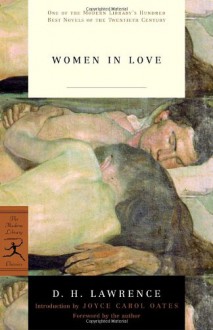With an Introduction by Joyce Carol Oatesforeword by the authorCommentary by Carl van Doren, Rebecca West,Aldous Huxley, and Henry MillerIt is . . . the world of the poets and the preponderance of the poet in [Lawrence] that is the key to his work. He magnified and deepened experience in the...
show more
With an Introduction by Joyce Carol Oatesforeword by the authorCommentary by Carl van Doren, Rebecca West,Aldous Huxley, and Henry MillerIt is . . . the world of the poets and the preponderance of the poet in [Lawrence] that is the key to his work. He magnified and deepened experience in the manner of a poet," wrote Anaïs Nin in 1934. Privately printed in 1920 and published commercially in 1921, Women in Love is the novel Lawrence himself considered his masterpiece. Set in the English Midlands, the novel traces the lives of two sisters, Ursula and Gudrun, and the men with whom they fall in love. All four yearn for fufillment in their romantic lives, yet struggle in a world that is increasingly violent and destructive. Commenting on the novel, which was composed in the midst of the First World War in 1916, Lawrence wrote, "The bitterness of the war may be taken for granted in the characters." Rich in symbolism and lyrical prose, Women in Love is a complex meditation on the meaning of love in the modern world. To the critic Alfred Kazin, "No other writer of [Lawrence's] imaginative standing has in our time written books that are so open to life."D. H. LAWRENCE (1885-1930), the son of a coal miner and a lace worker, completed his formal studies at University College, Nottingham, in 1908 and began teaching at a boys' school. By 1912, he had abandoned teaching to write full-time. His novels include The White Peacock (1911), The Trespasser (1912), Sons and Lovers (1913), The Rainbow (1915), Women in Love (1920), The Plumed Serpent (1926), and Lady Chatterley's Lover (1928), which was banned as pornographic in England until 1960.
show less

